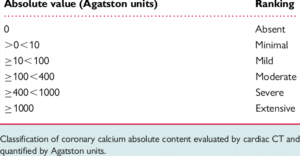
If your coronary calcium score gets higher with each subsequent test, you have every reason to be very alarmed.
How many coronary calcium tests have you had, and has your score gotten higher each time?
If so, this should be great cause for concern, says a study that appears in the Journal of the American College of Cardiology.
I had my coronary calcium score test done in June 2011, and my score was zero (meaning, no detectable hard plaque in my arteries).
The “warranty” on this is good for five years, said my cardiologist.
I had the procedure because my mother’s emergency quintuple bypass surgery rattled me.
But what about people who have serial coronary calcium scans, and find that their number keeps getting higher and higher?

The study says these patients are over six times more likely to have a heart attack or succumb to heart disease than are people who don’t have an increasing calcium score.
The study recommends that for people with measurable plaque in their arteries, they should have more frequent tests.
The researchers, who analyzed serial calcium scoring in over 6,700 patients, found that the six-times increased risk of cardiac events was independent of other risk factors for coronary artery disease.
“We have known that coronary artery calcium can be related to heart disease,” says Matthew Budoff, MD, “but this study shows the progression of accumulation of the calcium in the arteries can be a significant factor in evaluating the risk that a patient may suffer a heart attack in the future.”
My calcium score test was not covered by my insurance.
I had it done at an independent cardiac imaging clinic.
I don’t recall the cost, but it can vary from $200 to $400.
The test takes five minutes or so.
You simply lie on a bed, with your chest and head inside a donut shaped piece of equipment (CT scanner) while it scans your heart. No contrast dye or injections are used.



























